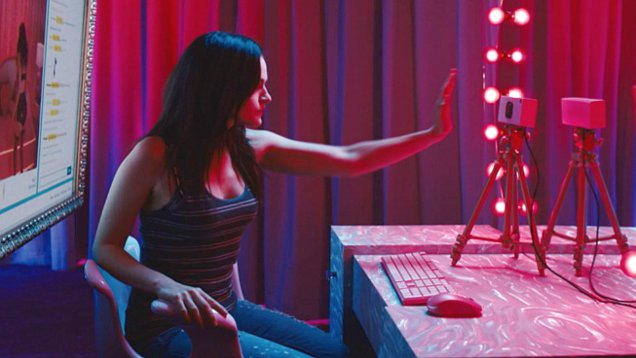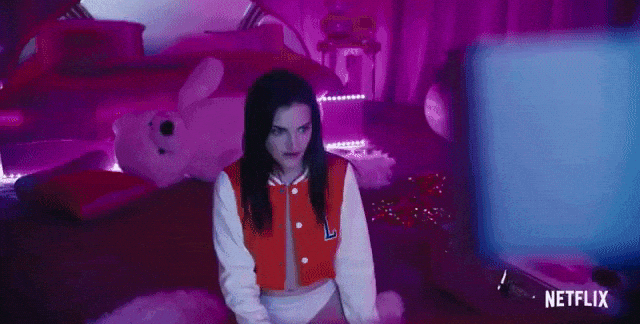Netflix’s brilliant thriller Cam is an electrifying experience that will be debated for decades

Netflix’s new film Cam isn’t just an electrifying thriller, but a dazzling work that says important things about the current world live in. Critic Luke Buckmaster explains why.
Few films use truly contemporary aesthetic to explore truly contemporary conditions. Even fewer do so with a modicum of the bravado exhibited in director Daniel Goldhaber’s outstanding debut feature Cam. The filmmaker borrows imagery used in day to day computing and recently beamed into ‘screen’ thrillers Searching and Unfriended, which, while commendable experiments with an emerging visual style, appear weak-kneed by comparison. Cam‘s images are given a hot neon glow by cinematographer Katelin Arizmendi, infusing Isa Mazzei’s screenplay with twitchy, techy, post-millennium art and angst.
This strikingly distinctive film – about a camgirl whose online identity is stolen by a doppelganger – left me with nerves jangled and fingernails chewed. Goldhaber conjures a nightmare at once biological and virtual, technophilic and technophobic, stopping just shy of suggesting screen time might be nothing less than the downfall of ethics and conscience. It is a social commentary of sorts and a nightmare that could not belong to any moment in history other than now. The general theme of technology’s irreversible effect on human behaviour combines with many specific talking points, including the nature of online identity and placelessness in the modern world.

In Cam the nightmare is not (or not only) in the protagonist’s head but in digital realms around her, for which there is no circadian rhythm; no sense of natural order. Mazzei wrote the script inspired by her own experiences as a sex worker, working closely with Goldhaber to strip the film of a male gaze.
Protagonist Alice (a powerful Madeline Brewer) is a camgirl obsessed with climbing the rankings of a competitive platform where gold tokens are the coin of the realm, paid by leering observers. They have a ‘seen it all before’ attitude that encourages race to the bottom style content creation. In a sense the story begins where the great television satire Network ended: with the death of a protagonist live on air. Alice however is only faking it, pretending to cut her throat to draw more eyeballs and procure more engagements (the film also works as a commentary on social media).
Editor Daniel Garber chops together visions of screens, browser windows, windows within windows and occasionally – when these people are important to the progression of the story – real humans behind the user names. Watching Cam means coming to terms with several things: the technology of the industry it captures; the technology and aesthetic of the film itself; the protagonist’s unusual and increasingly fraught circumstances. It is thrilling before the core premise kicks in at around the 30 minute mark. Alice discovers she cannot sign in and is blocked from her account. More disturbingly, another woman has taken her place and performs live before her eyes, looking and sounding exactly like her.
In the present, digitally-powered, online-enabled world the concept of a doppelgänger is not necessarily what it used to be. Goldhaber and Mazzei use horror to express incisive commentary on the age of influencers and algorithms. Their narrative is pointendly focused on its protagonist but many questions swirl around it. Can voyeurism and exhibitionism become the same thing? When we spend so much time observing each other through screens, what is the difference between looking at a virtual or real person?
When Cam spills over into the realm of science fiction it also – for reasons I won’t explain in fear of divulging spoilers – argues that real pain comes from real bodies, countering the familiar proposition that computers may one day develop or be given a sense of suffering. Wrapped up in this is a perverse hope – the last cries of a doomed species, a cynic might say – that this potential to feel real pain, bodily and otherwise, might in some strange way be our best shot at redemption.
What a film. What a ride. I watched Cam twice in three days, the 24 hours in the middle necessary for collection of breath and steadying of mind. If the film’s ending is galling it is galling for a worthwhile reason, viewing plot resolution less as the completion of a story per se than an opportunity to toss around another big idea or two before the closing credits roll. This film will surely become a locus classicus in the genre of stories about online sex workers. It is very much of the moment but also – back to my original point – an exploration of truly contemporary conditions through truly contemporary aesthetic. Cam will discussed, debated, dissected, studied, impersonated for a long time to come. More exciting than the film itself, perhaps, is how that discourse will play out: what things audiences will glean from it now and into the future, and how they will come to terms with its messages.

















